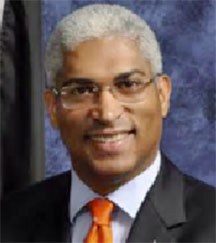(Trinidad Express) Illegal firearms account for 72 per cent of murders in Trinidad and Tobago compared with 2.4 per cent in the United Kingdom, according to Attorney General Garvin Nicholas.

He was piloting the Bail (Amendment) Bill 2015 in the Senate which was passed Tuesday evening.
Noting that there were concerns about the bill, Nicholas said the bill’s provisions are designed to “ensure that it would not be business as usual with the illegal firearm-toting minority”.
He said normal law-abiding citizens have nothing to fear. He said persons who will be targeted by the bill are those who already have a pending charge for a serious offence and are then arrested and charged for possession of an unlicensed firearm, or those who are using an unlicensed firearm in the serious commission of a crime.
He said the bill will be in effect for 16 months. He said he hoped this short duration would allay the fears of those who worry about the draconian provisions. “At least we would have tried,” he said, noting that after 16 months the bill would die a natural death and would cease to function.
Independent Senator Helen Drayton was critical of the amendment and did not vote for it. She said it would put more persons who may be innocent in jail for years. She said she had not heard a plausible explanation of what exactly the bill was designed to cure over previous bills. She said despite the severity of the Anti-Gang law, only three to five persons have been prosecuted under the Anti-Gang law since 2011. Saying she believed there had to be judicial scrutiny over bail, Drayton said after Monday the nation saw a taste of what arbitrary action by the police can do. “So anyone who believes that this bill does not provide an opportunity for (police) abuse, I don’t think they are living in Trinidad and Tobago,” she said.
Drayton said there were other pressing priorities which needed addressing.
For instance, she said Government has not given any credible reason during the past four years for not bringing legislation for improving the procedure for recruiting a Police Commissioner or for confirming the appointment of the acting Police Commissioner.
She said it was “unacceptable” and “disturbing” that this urgent matter had gone unattended and it left one to wonder whether at the level of the Government there was respect for the leadership of the Police Service. “It is inexcusable,” she said.
She said it would also serve the public interest if the Police Complaints Authority (PCA) was adequately resourced and had improved powers to investigate in order to deal effectively with police abuse. She said it would serve the public if the compensation of workers in the National Security system and emergency services was addressed in a timely and proactive manner.
